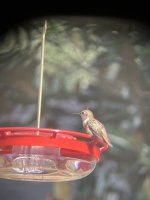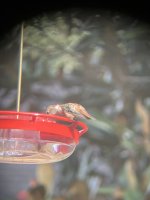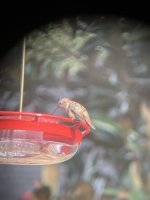Hallawhosit
Member
Hello!
I live in North Florida and so I mostly see Ruby-Throated Hummingbirds. The last few weekends, we've seen this little guy who looks quite different to me. I've heard that Rufous hummingbirds can come here in the winter, but I've never seen one. While I would love to add a new species to what I've observed, I don't want to assume I've seen an uncommon bird without getting the advice of more experienced folks. Pictures of Allen's hummers look very similar, but that would be even more of a rare sighting from what I've read. I welcome your thoughts and suggestions! Thank you very much!
Hallawhosit
I live in North Florida and so I mostly see Ruby-Throated Hummingbirds. The last few weekends, we've seen this little guy who looks quite different to me. I've heard that Rufous hummingbirds can come here in the winter, but I've never seen one. While I would love to add a new species to what I've observed, I don't want to assume I've seen an uncommon bird without getting the advice of more experienced folks. Pictures of Allen's hummers look very similar, but that would be even more of a rare sighting from what I've read. I welcome your thoughts and suggestions! Thank you very much!
Hallawhosit







